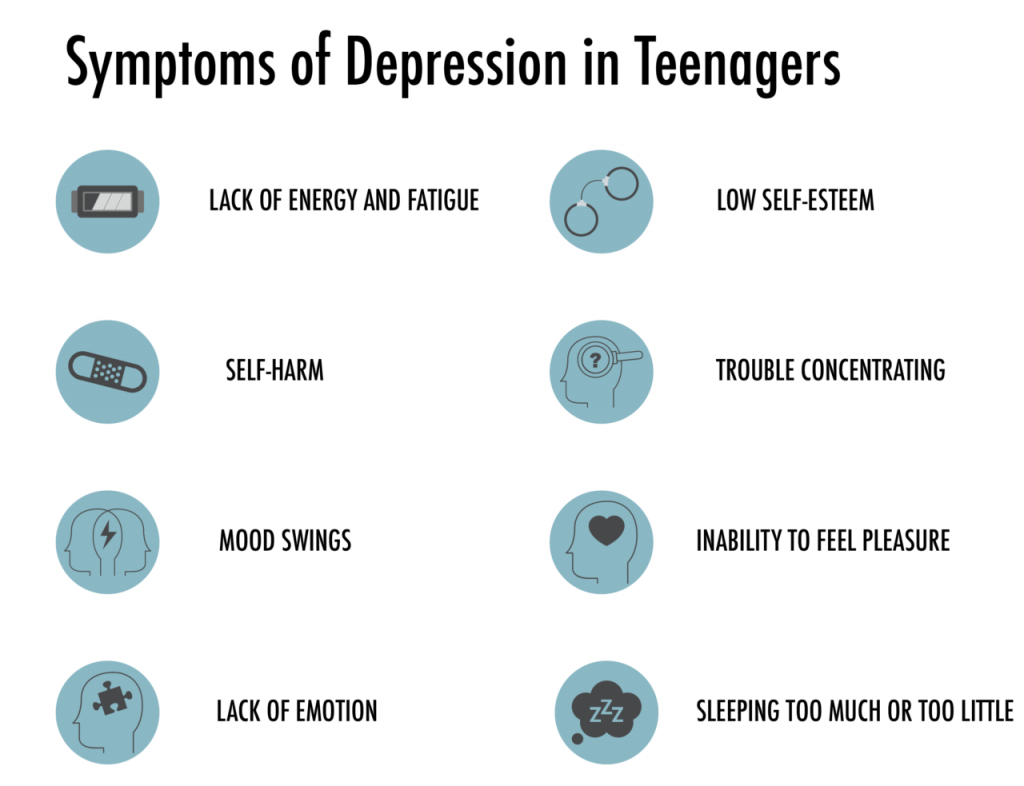A Quick Guide
Depression is a mental health condition that affects people of all ages, even teenagers. Teens often have different signs of depression than adults, so it can be hard to tell if they are depressed. A few typical signs of depression in teens are feeling sad or angry all the time, changing the way they eat or sleep, losing interest in things they used to enjoy, feeling useless or guilty, and having thoughts of hurting themselves or ending their lives. If you think a teen is depressed, you should get help right away from a professional. This article will look at the numerous symptoms of depression in teenagers along with its causes and how to recognize and treat the symptoms.
Understanding Depression
Depression is a very common mental illness that affects millions of people all over the world. The World Health Organisation (WHO) states that depression is the top cause of disability around the world, and it can happen to people of any age. Teenagers are especially prone to depression because they go through so many changes during adolescence. Sadly, depression in teens is often not recognized or treated, which can have very negative consequences. So, it’s important to know how to spot the signs of depression in teens so they can get the right help.
Learn more about Mild Depression: 6 Telltale Signs, Causes, & Self-Help Strategies
Signs of Depression in Teens
The following are some common signs of depression in teens:

- Constant sadness or irritation
Sadness or anger that doesn’t go away is one of the most frequent indications of depression in teens. Teens with depression might appear sad or moody for no reason, and they might feel like all things are useless. They might also get angry quickly and lash out at friends or family. Depressed teenagers, for example, may refuse to socialize with their peers and prefer to spend all of their time isolated in their private spaces.
- Changes in eating or sleeping patterns
When a teen has depression, that may change how they eat or sleep. They may eat too much or not enough, which can cause them to gain or lose weight. They may also have difficulty falling asleep or sleeping too much, which can make them tired and make it hard for them to focus during the day.
- Loss of interest in things
Teens with depression may also lose interest in things they used to enjoy. They might stop playing sports or connecting with clubs, and they might spend less time with friends and family. They may also lose interest in things like schoolwork or hobbies that used to be important to them.
- Feelings of not being good enough or guilt
Teens with depression may find it hard to get rid of feelings of worthlessness or guilt. They might think they’re inadequate or feel like a burden on other people. They may also feel a lot of guilt over things they have no control over.
- Physical symptoms
Depression can also appear in the body as headaches, stomachaches, and exhaustion, among other things. The stress and worry that comes with depression may be the root of these symptoms. For example, a kid who is depressed may often complain of headaches or stomachaches, even if they don’t have a medical problem.
- Social isolation
Teens with depression may pull away from their friends and family and become socially isolated. They might avoid going out with other people and stop doing things they enjoyed in the past.
- Suicidal or self-harming thoughts
Teens who think about hurting themselves or ending themselves might be the most serious sign of depression. Teens who are experiencing depression may feel that life is not worth living and may think about hurting themselves or killing themselves. If someone talks about hurting themselves or killing themselves, it’s important to take them seriously and get them help right away.
Watch: [5 Signs of Teenage Depression]
Causes of Depression in Teens
Teen depression can be caused by many things, like genes, brain chemistry, environment, and life events. For example, a teen may be more likely to have depression if other people in their family have had it. In the same way, changes in the brain’s chemistry, like imbalances in serotonin or dopamine, can lead to depression. The chance of depression can also be increased by things like a difficult home environment or constant stress. Lastly, major life events like the death of a loved one or the end of a relationship can cause depression in some teens.
How to recognize depression in teens?
Because the signs can be subtle and confused with typical teenage behavior, it can be difficult to spot depression in teens. But parents, teachers, and health care workers can look for signs like changes in mood or behavior, loss of interest in activities, variations in eating or sleeping patterns, and thoughts of self-harm or suicide. If any of these symptoms appear, it’s important to get professional help.
How to deal with depression in teens?
There are many successful ways to treat depression in teens, such as therapy, medication, and making changes to the way they live. Medications like antidepressants can also help some teens, but they should only be taken with the help of a medical professional. Here, we will discuss some types of therapeutic approaches that can help.
Cognitive-behavioral therapy (CBT)
It is a type of treatment that has been shown to be especially helpful for teens with depression. CBT works on finding negative patterns of thinking and changing them with healthier ones.
Interpersonal Therapy (IPT)
IPT is a type of therapy that helps people improve their relationships and their ability to talk to each other. Its goal is to help teens figure out and solve any interpersonal issues that might be causing their depression. IPT can be especially helpful for teenagers who are suffering from depression as a result of problems in their relationships, like fights with family members or peers.
Dialectical Behavior Therapy (DBT)
DBT is a type of therapy that helps kids learn how to deal with their feelings and get along better with others. It uses parts of cognitive-behavioral treatment (CBT) and strategies based on mindfulness and acceptance. DBT is particularly beneficial for teens who are hurting themselves or having suicidal ideas.
Psychodynamic Therapy
It is a type of therapy that looks at unconscious patterns and past events that may be causing depression in teens. Its goal is to help teens understand their feelings and actions and come up with better ways to deal with them. Psychodynamic therapy can be especially helpful for teens who have been through trauma or who have trouble expressing their feelings.
Family Therapy
In family therapy, the teen and their family work together to enhance communication and handle problems. Its goal is to help families see things from each other’s points of view while working in tandem to encourage the teen to get better. Teens who are suffering from depression as a consequence of family stressors or conflicts may benefit especially from family therapy.
Group Therapy
In group therapy, you work with a group of people who are all dealing with depression. It gives teens a safe place to talk about their stories and learn from each other. Group therapy can be especially helpful for teenagers who feel alone or who need the support of people who understand what they are going through.
All of these methods can help teens with depression, and the best one will depend on their requirements and preferences. Parents and healthcare professionals must work together to find the best treatment choices for every teen.
Key Takeaway
Depression is a dangerous mental illness that can happen to anyone, even teens. Even though it can be hard to spot the signs of depression in teens, it’s important to do so to make sure they get the right help. Figuring out and treating depression in teens takes a multi-pronged approach that includes both professional help and changes to the way they live. Teens with depression can go on to live happy, healthy lives if they get the right help.
We hope that this article helped you find out more about the potential signs and symptoms of depression in teens.



 Healing Your Inner Child: A Short Guide
Healing Your Inner Child: A Short Guide  What You Need to Know About Trauma & its effects
What You Need to Know About Trauma & its effects  Dealing with a Narcissistic Parent: Strategies and Support
Dealing with a Narcissistic Parent: Strategies and Support  Understanding the MBTI Personality Types
Understanding the MBTI Personality Types  Understanding the Big Five Personality Traits
Understanding the Big Five Personality Traits  Body Image: what it entails and how it affects you
Body Image: what it entails and how it affects you